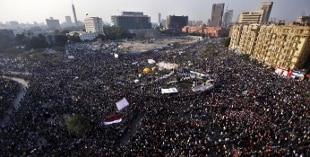- Egypt, former President Mubarak returns free after 6 years
- Egypt, truck bomb against police checkpoint: massacre of agents in Sinai
- Tunisia raises an anti-jihadist wall on the border with Libya
- Tunisia, more protests and unrest: a curfew begins. Looted shops in Tunis
- Tunisia, Sousse massacre: the killer would have trained in Libya with Bardo museum bombers
- Tunisia, clashes between the army and militants on the border with Libya: 26 dead, there is also a 12 year old
- Six years of conflict in Syria. The numbers of the drama
Share
24 March 2017With the release of former Egyptian President Hosni Mubarak today, the so-called Arab springs symbolically come to an end. But where are the leaders laid in that season of popular riots and riots? And how have the structures of power in the region changed?Egypt: Mubarak
Mubarak resigned on 11 February 2011 after thirty years of government surrendering power to the army after 18 days of revolt. Arrested in April, Islamist Mohamed Morsi, the first elected president of Egypt, was elected in his place. Morsi has in turn been deposed by the army led by current President Abdel Fattah al-Sisi. Sentenced to life imprisonment in 2012 for the bloody repression of the uprising (850 protesters killed) was acquitted by the court of appeal on March 2, 2017. On March 24 he is released.
Tunisia: Zinedine el Abidine Ben Ali
A month of protests sparked by poverty and unemployment forced Tunisian President Zine El Abidine Ben Ali and his family to leave the country on January 14, 2011, after 23 years of power. Refugee in Saudi Arabia, Ben Ali (80 years old) has maintained a casso profile by communicating only through his lawyers. He was sentenced to life in prison for corruption and violence against protesters.
Syria: Assad, still in power
Syrian President Bashar al-Assad is still in power after six years of civil war in which the regime was supported by Iran, Russia and Hezbollah while several rebel groups supported by Turkey, the Gulf states and some western governments are trying to overthrow him and they are calling for a political transition. However, the rebel forces have been supplanted by the al-Qaeda and ISIS Jahidists against whom an international coalition is mobilized.

